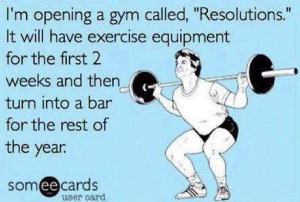Are you one of the millions of folks that made a New Year’s resolution? We’re into February, have you stuck with it? If not, why? More importantly, does it matter to you? It’s important to analyze this. It’s estimated that 45 percent of American’s make New Year’s resolutions with about 66 percent of those being fitness goals. By the time February rolls around most resolvers have abandoned their New Year’s resolution. Top reasons include being too busy or not being committed to their goals in the first place. Is this you?
Setting goals and being able to achieve them is a learned skill. You don’t come out of the womb armed with goal setting abilities. To be successful in achieving goals there’s certain things you need to want or put in place. Number one, you have to have the desire for your defined goal. You have to want it! If you’re simply joining in what everyone else is saying because it sounds good and you need to lose weight it’s not going to be effective. Every goal requires work, energy, and focus therefore you’ve got to want it enough to be able to concentrate your efforts in that direction.
Saying I want to lose weight or I’m going to begin an exercise program is too general. You have to be specific about your goals. They need to be clearly defined by not only what it is you want to do but how long it’s going to take you to achieve them. In example, losing 30 pounds over a 16 week period offers some detail. This forges a sort of concreteness to your goal as you clearly defined exactly what it is you want to do and over what time period. Beginning an exercise program you would set yourself up for success by defining the number of times per week you plan on exercising, the duration of that exercise, and the activity of the exercise. And don’t be over zealous on this one! A common error! Telling yourself you’re going to go to the gym six days a week when you haven’t been to the gym in years is setting yourself up for failure. Be realistic.
Now that you’ve clearly defined and specified what your goals are you need to share this with someone. This gives ownership to what you’re trying to accomplish and it also provides a confident to share in your successes. I also strongly urge writing down the specifics of your goals and keep this visible; someplace you see it every day. Sometimes we just need to have it in our face as a reminder of what we want to accomplish.
Now you need to define what this pathway of success is going to look like, how you’re going to get there. This can be a little tougher as it requires specificity on how and what you’re going to do to accomplish your goal. If your goal is to lose 30 pounds over 16 weeks then you need to look at your current eating habits and make the necessary adjustments to facilitate weight loss or hire a nutritionist. This is a critical component for success because this is about clarity in the details and needs to be recorded for visualization. If you work long hours and your goal is to go to the gym to lift weights and do cardio for 60 minutes three times per week you need to decide when and where you’re going to carve out the time to do so and lock those dates in. Clarity.
Now once the specifics of your goals are clearly defined you simply go to work. They say variety is the spice of life and so is true for consistently maintaining an exercise regime or long term food goals. Having a plan makes all the difference in leading to your success. The military has a saying, “Fail to plan, plan to fail.” Pretty straight forward and right on the nose!
Within the confines of your over-all goal, define moments of achievement. In the weight loss goal for example, when you lose those first ten pounds celebrate your win! But not with food! Reward yourself with something outside of the food arena, like a new blouse or pair of shoes, or a massage or facial. Allowing yourself to enjoy wins along the way to your goal not only provides encouragement for what you’ve accomplished but it also helps re-train your brain about what those rewards should look like. You’ll find enlisting this behavior will transfer to other parts of your life as well.
We all have set backs. But what’s key is not allowing a bad day define you or your goal so don’t beat yourself up over a moment in time. It’s just that, a moment in time. There’s later in the day or tomorrow to regroup. Having this mind set is a powerful aid. Ever see a gymnast fall off the beam and then get back up and finish her routine without additional errors? This is the power of that mindset. It’s where you focus your energy and your time. Not in the fall which just cost half a point but in a flawless effort for the remainder of the routine. You have to let those bad moments roll off your shoulder and look optimistically forward to your next success.
There’s no time like the present now go out and get it done!
Yours in health,
Samantha L. Madsen, MS, CSCS
“Train Smart, Eat Right, Rest Well, Supplement Wisely”
Comments Off on EXCUSES DON’T BURN CALORIES


